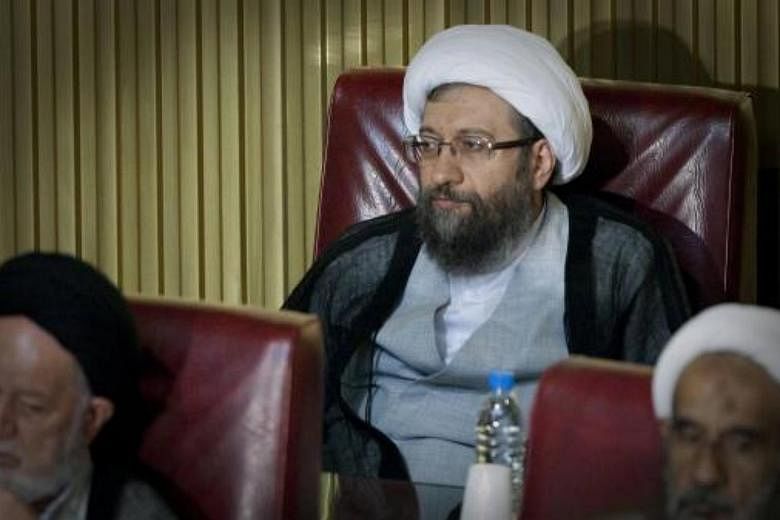DUBAI (REUTERS) - Iran said on Saturday (Jan 13) it would retaliate against sanctions imposed on its judiciary head by the United States as President Donald Trump stepped up efforts to'fix' a nuclear deal between Teheran and major powers.
Trump said on Friday he would waive nuclear sanctions against Iran for the last time to give Washington and its European allies a chance to fix the "terrible flaws" of the 2015 nuclear deal.
Washington also announced sanctions against 14 entities and people, including the head of Iran's judiciary, Ayatollah Sadeq Larijani.
"The Trump regime's hostile action (against Larijani)... crossed all red lines of conduct in the international community and is a violation of international law and will surely be answered by a serious reaction of the Islamic Republic," Iran's Foreign Ministry said in a statement carried by state media.
On Friday, Iran's Foreign Minister Mohammad Javad Zarif said on Twitter on that Trump's decision undermined the multilateral agreement.
Trump, who has sharply criticised the deal reached during Democrat Barack Obama's presidency, had privately chafed at having to once again waive sanctions on a country he sees as a rising threat in the Middle East.
"This is a last chance," Trump said, pushing for a separate agreement. "In the absence of such an agreement, the United States will not again waive sanctions in order to stay in the Iran nuclear deal. And if at any time I judge that such an agreement is not within reach, I will withdraw from the deal immediately."
The EU said in a statement it had taken note of Trump's decision and would assess its implications.
Trump laid out several conditions to keep the United States in the deal. Iran must allow "immediate inspections at all sites requested by international inspectors," he said, and "sunset" provisions imposing limits on Iran's nuclear programme must not expire.
Trump said US law must tie long-range missile and nuclear weapons programmes together, making any missile testing by Iran subject to "severe sanctions."
The president wants Congress to modify a law that reviews US participation in the nuclear deal to include "trigger points" that, if violated, would lead to the United States reimposing its sanctions, one senior administration official said.
This would not entail negotiations with Iran, the official said, but rather would be the result of talks between the United States and its European allies. Work already has begun on this front, the official said.
Analyst Richard Nephew said whether Trump's conditions could be met depended on whether he wants a face-saving way to live with the nuclear deal with the political cover of tough-sounding US legislation, or whether he really wants the deal rewritten.
Nephew, a former White House and State Department Iran sanctions expert, said legislation could be drafted that might appear to assuage Trump's concerns, but that getting Iran to agree to allow unfettered international inspections or to no time limits on the nuclear deal's restrictions was impossible.

